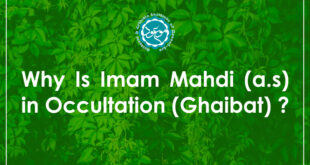Once Imam (as) was passing by through wilderness when a deer, which was being followed by a hunter came running to Imam (as) and said something to him. Indeed a divine Imam (as) understands and speaks all the languages including that of the birds and animals. Imam al-Baqir (as) has said,
“We have been taught the language of the birds and we have been given of everything”.
As soon as the deer spoke to Imam (as), Imam (as) interrupted the hunter and said, “The deer has requested that it be spared for the time being as it had to go and feed her two kids. She has promised to return to the same spot and then you can killer her and sell her flesh”. The hunter was puzzled and asked, “How can you understand its language and what’s the guarantee that the deer will return?” Imam (as) said, “I will give the guarantee and I will stand at the spot until it returns”. The hunter let the deer go and meanwhile, many people gathered around to see the spectacle. After feeding its two kids, the deer returned and stood at the same spot. It also asked the Imam (as) to take care of her two kids and that she was ready to be killed. People were amazed by this miracle. Even the hunter gave up the idea of killing that deer and this started off the tradition of Imam-e-Zamin, which means ‘the Imam who is Guarantor’.
His Mother
There is a great deal of dispute regarding the name of his mother. Some say she was called al-Khayzaran; others say she was Arwi and that her nickname was “the blonde of Nubia,” while others say she was Najma and her nickname was “Ummul-Baneen.” Others say she was called Sekan the Nubian; still others say she was called Takattam as may be proven from the poetry in his praise which said:
The best in self and parenthood,
In offspring and in ancestry,
Is Ali al-Muaddam,
Eighth in series of the knowledgeable
and the clement,
An Emam descending from the Proof of God,
that is Takattam.
Offspring
Disputes exist also regarding the number of his offspring and their names. A group of scholars say that they were five sons and one daughter, and that they were: Muhammad al-Qani’, al-Hassan, Ja’fer, Ibrahim, al-Husayn, and ‘Ayesha.
Sabt ibn al-Jawzi, in his work Tadhkiratul-Khawass, says that the sons were only four, dropping the name of Husayn from the list. Al-Mufid inclines to believe that the Emam did not have any son other than Emam Muhammad al-Jawad (A.S.), and Ibn Shahr Ashoob emphatically states so, and so does al-Tibrisi in his A’lam al-Wara. Al-‘Udad al-Qawiyya states that he had two sons, Muhammad and Mousa, and that he did not have any other offspring. In his claim, he is supported by Qurb al-Asnad in which the author says that al-Bazanti asked al-Rida, “For years I have been asking you who your successor is and you keep telling me that it is your son even when you had no son at all, but since God has now blessed you with two sons, which one of them is he?” ‘Uyoon Akhbar al-Rida indicates that he had a daughter named Fatima.
We are not in the process of investigating, researching and pinpointing with accuracy the number of his offspring and their names, but what seems to be more reasonable is what al-Mufid states. What is established as a fact with us is that Emam Muhammad al-Jawad (A.S.) was his son; as regarding his other sons, nobody seems to be able to prove any facts regarding them, and God knows best.
Personality and Characteristics
Generally speaking, an Emam enjoys a unique personality and distinctive characteristics, in as far as Shi’a followers of the Emams are concerned; therefore, he is not permitted to do what others are, such as falling into error, or getting confused about a matter. Rather, infallibility is essential in him since he conveys on behalf of the Prophet (S.A.W.) what seems to others to be obscure of the Message and its intricacies. Just as we proved the infallibility of the Prophet (S.A.W.), we, by the same token, prove infallibility for the Emam as well with one exception: the Emam conveys on behalf of the Prophet (S.A.W.), whereas the Prophet conveys on behalf of the Almighty God. The wisdom in this argument is that should falling into error be accepted and expected from the Prophet (S.A.W.) or the Emam, then doubt will result regarding the reliability of what they convey to people of jurisdic rules and regulations and other such matters since they are liable to err in their judgement or get confused about a particular issue.
Although the believers are not held accountable for doing what they are not supposed to be doing due to such error of judgement, the assumption of the error of judgement itself collides with the very wisdom behind the reason why prophets were sent to people at all which is to clarify to people, according to the way God Almighty intended them to, without any error or confusion, what His Will is.
The topic of infallibility is a vast one the discussion of which has no room here and which requires a dedicated research I may be able one day to tackle. What I have to same fa here is that Emamate is characterized by certain distinctive aspects such as infallibility which we cannot discuss by itself with others except after both parties agree on the basis from which it emerged; otherwise, our case would be like one who discusses the necessity of performing the ritual prayers (salat) with someone who does not believe in the message of the Prophet (S.A.W.).
The basic point upon which we have first and foremost to agree is the definition of general Emamate, then the distinctions it requires and, finally, the proofs which testify to these distinctions. It is only then that disagreeing parties can conduct a reasonable discussion. Having been convinced by unequivocal proofs of such infallibility, and having seen the Twelve Emams (A.S.) to be fully qualified to be the only ones in whom such infallibility could be observed, we became fully convinced of their unshakable superiority over all others, and that they were the ones adorned with absolute human perfection.
An Emam, according to this viewpoint, has got to be the most learned among people and the most aware of the general needs of people such as knowledge or other necessities of life, and that he has to be the most pious, the most ascetic, the most perfect in personal conduct and norms of behaviour. In other words, in order to be qualified for Emamate, one has to be superior to everyone else in all aspects of perfection and its requirements which all raise him to his position of leadership. On this basis, the character of Emam al-Rida (A.S.), who is one of these Twelve Emams, becomes clearly distinctive due to its merits. But this is not the limit of the scope of this research; rather, we shall attempt to research his personality and the qualities which distinguished him from all others by our sifting into the legacy history has preserved for us of his conduct while still alive, and from the stances taken by the men of knowledge and by contemporary caliphs towards him.
Government’s Attitude Towards the Emam
The attitude of the then rulers towards Emam al-Rida (A.S.) and the other Emams may provide us with a clear view of the distinctions which raised their personalities to the zenith. And it is essential to explain the phenomenon of the government’s attitude towards them which manifested itself in the surveillance imposed upon them rather than upon other distinguished dignitaries or chiefs of the Alawides, monitoring their movements and counting their steps in all their social and personal encounters. What we can mention here to explain this phenomenon are the following reasons:
1) The belief of a large number of Muslims in their Emamate and in their being the most worthy of the caliphate, and their conviction that all other caliphs are considered usurpers of authority, trespassers upon the rights ordained by God to others. This is why the politicians of the time considered them their competitors whose mere presence increased the dangers surrounding them and jeopardized the security of the very existence of their government structure.
2) Their being the magnet which attracted leading scholars and thinkers who shrank in their presence despite their intellectual advancement and distinction in the fields of the arts and knowledge and despite their genius and intellectual prowess. This caused the caliphs to feel a stronger animosity towards them and be more grudgeful towards them due to the public fascination by them and to their attempts to be close to them and to being emotionally distant from the center of the government.
3) Their being the better alternative from the public’s political standpoint to take charge of the responsibilities of government, bear its burdens, carry out its obligations and doing all of that most efficiently. This frightened the rulers and made the obscure future seem to their eyes even more so.
 Mouood Mouood English Edition
Mouood Mouood English Edition




